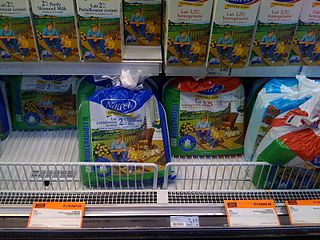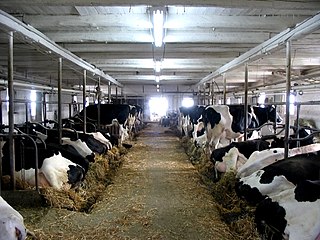
The Canadian Dairy Commission is an Ottawa-based Canadian government Crown Corporation that plays a role of administrator, facilitator and stakeholder in the public policy related to the Canadian dairy industry. The CDC's mandate is to coordinate dairy policies in a jurisdiction that is shared between both provincial and federal governments. In the early 1970s, when the dairy industry became the first industry in Canada to be operated under the national supply management system (NSMS), the CDC was named as facilitator and administrator coordinating dairy policies and providing a framework for the management of the Canadian dairy industry.
The Agricultural Marketing Service (AMS) is an agency within the United States Department of Agriculture, and has programs in five commodity areas: cotton and tobacco; dairy; fruit and vegetable; livestock and seed; and poultry. These programs provide testing, standardization, grading and market news services for those commodities, and oversee marketing agreements and orders, administer research and promotion programs, and purchase commodities for federal food programs. The AMS enforces certain federal laws such as the Perishable Agricultural Commodities Act and the Federal Seed Act. The AMS budget is $1.2 billion.

The National Dairy Development Board is an institution of national importance set up by an Act of Parliament of India. The main office is in Anand, Gujarat with regional offices throughout the country. NDDB's subsidiaries include IDMC Limited-Anand, Mother Dairy, Delhi, NDDB Dairy Services, Delhi and Indian Immunologicals Ltd, Hyderabad. The Board was created to finance, support and support producer-owned and controlled organisations. It's programmes and activities seek to strengthen farmer cooperatives and support national policies that are favourable to the growth of such institutions. Cooperative principles and cooperative strategies are fundamental to the board's efforts.

Operation Flood, launched in 1970, was a project of India's National Dairy Development Board (NDDB), which was the world's biggest dairy development program. It transformed India from a milk-deficient nation into the world's largest milk producer, surpassing the USA in 1998, with about 17 percent of global output in 2010–11. In 30 years it doubled milk available per person, and made dairy farming India’s largest self-sustainable rural employment generator. It was launched to help farmers direct their own development, placing control of the resources they create in their own hands. All this was achieved not merely by mass production, but by production by the masses; the process has been called the white revolution.

Dairy Farmers of America Inc. (DFA) is a national milk marketing cooperative in the United States. It is owned by and serves more than 14,500 dairy farmer-members representing more than 8,500 dairy farms in 48 states. DFA markets members' raw milk and sells milk and derivative products to wholesale buyers both domestically and abroad. Net sales in 2016 were $13.5 billion, representing about 22 percent of raw milk production in the United States.

The Federal Agriculture Improvement and Reform Act of 1996, known informally as the Freedom to Farm Act, the FAIR Act, or the 1996 U.S. Farm Bill, was the omnibus 1996 farm bill that, among other provisions, revises and simplifies direct payment programs for crops and eliminates milk price supports through direct government purchases.
The California Milk Processor Board is a nonprofit marketing board funded by California dairy processors, and administered by the California Department of Food and Agriculture, most famous for its Got Milk? advertising campaign.

The Dairy and Tobacco Adjustment Act of 1983 is a United States federal law.
In the United States, the Dairy Price Support Program is the federal government program that maintains a minimum farm price for milk used in the manufacture of dairy products. It is one of many agricultural support programs. Under the dairy program, the United States Department of Agriculture (USDA) indirectly assures a minimum price for milk by purchasing any cheddar cheese, nonfat dry milk, and butter offered to it by dairy processors at stated prices. These purchase prices are set high enough to enable dairy processors to pay farmers at least the support price for the milk they use in manufacturing these products.

The Northeast Interstate Dairy Compact was an agreement among the six New England states to support the farm price of milk at a higher level than under federally mandated minimum prices in the region.
Milk Income Loss Contract (MILC) Payments is the name given by USDA to the dairy farmer counter-cyclical payments program, authorized by the 2002 farm bill. Under the program, dairy farmers nationwide are eligible for a federal payment whenever the minimum monthly market price for farm milk used for fluid consumption in Boston falls below $16.94/cwt. A producer potentially can receive a payment equal to 45 percent of the difference between the $16.94 per cwt. target price and the market price, in any month that the Boston market price falls below $16.94. A producer can receive a payment on all milk production during that month, but no payments will be made on any annual production in excess of 2.4 million pounds per dairy operation. On average this limit is reached by a milking herd of 130 cows. MILC payments apply to production beginning December 1, 2002 through September 30, 2012.
Marketing orders and agreements in United States agricultural policy allow producers to promote orderly marketing through collectively influencing the supply, demand, or price of a particular commodity. Research and promotion can be financed with pooled funds.
In Canadian agricultural policy, the Market Sharing Quota (MSQ) is the federally determined target for the amount of industrial milk to produce nationwide each year as part of its policy of supply management. It is determined by estimating the domestic demand for dairy products on a butterfat basis, adding about 3% to cover exports and subtracting the volume of approved imports. Provincial shares of the national quota are adjusted in line with changes in the total and each province allocates its share to its producers according to its own quota policies. The Canadian Dairy Commission sets a target price for industrial milk based on production costs, including a return to labour, capital and management. Dairy farmers receive a payment from their provincial marketing board on in-quota deliveries of industrial milk. Farmers who produce in excess of their quota do not receive payments and in some provinces, may face a financial penalty. Each province maintains and administers its own quota scheme for fluid milk.
National dairy producers union (SOYUZMOLOKO), is a nonprofit organization created in March 2008 by milk producers of Russia in order to ensure cost-effective conditions for milk production, provide timely information for the members of the Union on the situation of the dairy industry, stimulate milk quality improvement and efficiency of milk production in Russia, as well as to represent and protect Union members interests at state and municipal authorities, public and international organizations.
Dairy Management Inc. is an American trade association funded primarily by the US Dairy Promotion Program, itself funded by government-mandated checkoff fees on dairy products and federal tax dollars and dedicated to promoting the sale of American-made dairy products. It also operates under the names Innovation Center for U.S. Dairy, American Dairy Association, National Dairy Council and U.S. Dairy Export Council.
Dairy Farmers of Ontario (DFO), is the marketing organization and regulatory body representing over 4,000 dairy farmers in Ontario, Canada. DFO was formerly known as the Ontario Milk Marketing Board (OMMB), which was established as result of the 1965 Ontario Milk Act. On August 1, 1995 the Ontario Milk Marketing Board and the Ontario Cream Producers' Marketing Board merged to form Dairy Farmers of Ontario.

Supply management (SM) is a national agricultural policy framework used in Canada that coordinates supply and demand of dairy, poultry and eggs through production and import control and pricing mechanisms designed to prevent shortages and surpluses, to ensure farmers a fair rate of return and Canadian consumer access to a high-quality, stable, and secure supply of these sensitive products.








